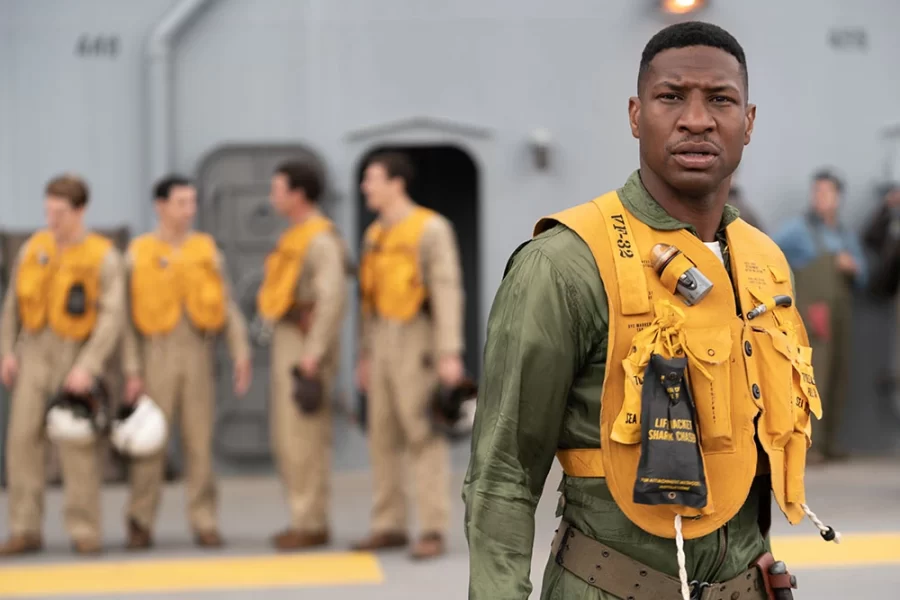‘Devotion’ Star Jonathan Majors on His Most Emotional Scene…
On Nov. 23, the actor returns to the big screen as Korean War hero Jesse L. Brown in J.D. Dillard’s Devotion. Majors’ performance as Brown chronicles his achievements as the first African-American naval aviator, as well as his heroics in the “Forgotten War.” The film features one of Majors’ most remarkable scenes to date, as he performs Jesse’s preflight ritual of reciting every terrible remark that’s ever been said to him. As one can imagine, the scene had quite an emotional impact on Majors.
When did you feel it in your bones that you needed to play Jesse?
I was reading [the script] on a plane of all places, and the moment that struck me first was probably the landing test where he has to land the Corsair. And just the way it was articulated in the script — the try and the fail, and the try again — it got me on the page. I was like, “Come on, man!” My blood started pumping, and I was like, “You can do this!” So I felt the odds against him. I felt that he was a man going upstream, but I knew that he could do it. And I knew he knew he could do it. That type of self-possession and that type of drive and grit really inspired me. I went, “Okay, I want to feel that. I want to give that to people.” So just in reading that moment, I was inspired, but there were many moments.
The bathroom mirror scene is a showstopper as Jesse, in order to ready himself for flight, repeats all of the appalling things that have been said to him over the years. Can you even begin to describe that day for you?
It was quiet. Something happens when you are in it. I woke up that morning, and of course, I knew it was coming. I saw the schedule weeks before in prep. It wasn’t much dialogue, so it’s not like you’re running lines. You’re not doing text work. And so it was very quiet that morning. I remember I got up and walked my dogs. I was in Savannah, and then I got in my car and drove to set. And I just kept listening to this song over and over again, and I just tried to keep my body as relaxed as possible.
I also thought about my grandfather a great deal, because he was a Black man in the Korean War. I thought about Jesse, and I thought about everything the book [Adam Makos’ Devotion: An Epic Story of Heroism, Friendship, and Sacrifice] said that he had experienced. I thought about where he came from, and ultimately, I just felt my body become so active. I was trying to be quiet and calm and cool; relaxation is key. So I just tried to see what he wanted to say and what this felt like for him. It’s something he’d done since he was a boy, and I thought, “Man, what a brain, what a heart, to come up with this ritual.”
And when we got there on the day, the set was still and quiet, and so that energy followed me. I was just pacing, breathing, pacing, breathing. J.D. [Dillard] then very gently walked up to me and said, “Okay, you ready?” And I said, “Yeah, I’m ready. Let’s go.” So it was a very quiet set, and this was after the rehearsal, so I know how the camera and everything is going to work. And J.D. said action very gently, thank God. So I walked out of the stall, and what comes out of my mouth, first take, is a completely improvised version of what the text was. And then I felt my body get hot. It was happening. That thing that actors really want to happen and pray will happen was happening. And from that moment on, it didn’t turn off between action and cut. It didn’t turn off.
So we’d finish, and then I would go back into the stall or to the other side of the room. And I would just kind of hold myself and rock back and forth, because I knew I didn’t want to fuck it up at that point. Because whatever was happening, was happening, and I just needed to stay out of the way and let Jesse’s story come out. I needed to let my ancestors’ story come out and anybody else who felt marginalized and put down to that degree. J.D. and [DP] Erik Messerschmidt and the rest of the crew really made room for that, and so we did it. We did it four times, and that was that.
And when it was done, when we cut, I went to the back room, and as I said, it wasn’t shutting off. So I got down on all fours and I just let the rest of it come out. At the end of the scene, he cleans himself up and goes, but I didn’t have anything to go off to and put that energy into. And so I did have to purge it at the end. I don’t know how it happened, really, but I’m very grateful to Jesse that he came through in that way.
Read the entire interview here: Devotion: Jonathan Majors on Most Emotional Scene, Creed III – The Hollywood Reporter

